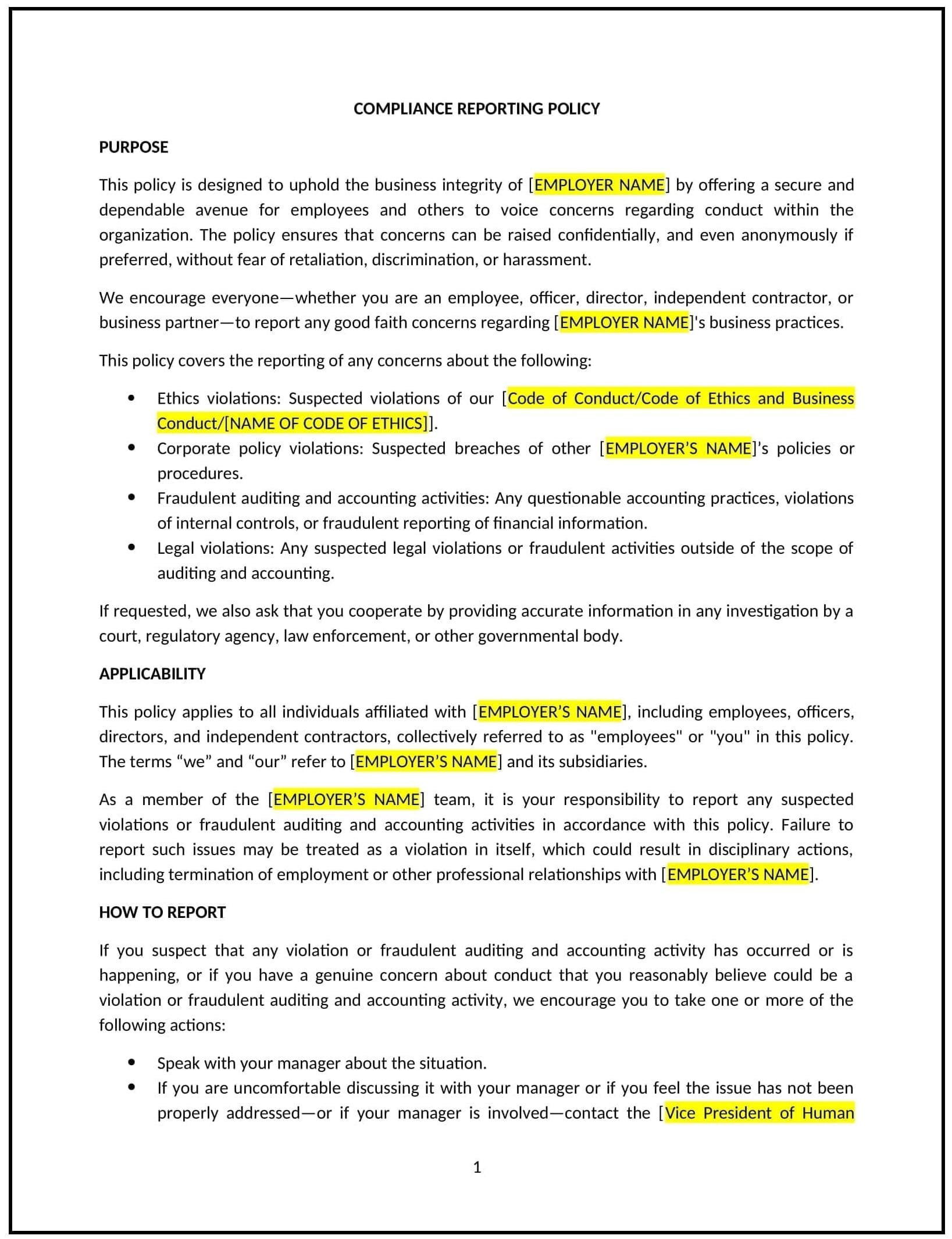Got contracts to review? While you're here for policies, let Cobrief make contract review effortless—start your free review now.

Customize this template for free
This compliance reporting policy is designed to help Texas businesses establish clear guidelines for employees to report any violations of legal, regulatory, or company policy standards. Whether businesses are managing reports of unethical behavior, non-compliance with regulations, or violations of internal rules, this template provides a structured approach to handling compliance issues while ensuring transparency, confidentiality, and non-retaliation.
By adopting this template, businesses can maintain a strong ethical framework, ensure adherence to legal requirements, and promote a culture of integrity and accountability.
How to use this compliance reporting policy (Texas)
- Define reportable violations: Clearly specify the types of violations that should be reported under the policy, including breaches of legal regulations, company policies, ethical misconduct, fraud, harassment, or safety violations.
- Set reporting channels: Outline the available channels for employees to report compliance issues, such as direct supervisors, HR, a designated compliance officer, or anonymous reporting systems.
- Protect whistleblowers: Emphasize the company’s commitment to protecting employees who report violations, ensuring they will not face retaliation or adverse actions for coming forward.
- Outline investigation procedures: Provide clear instructions on how reports will be handled, including the process for investigating complaints, maintaining confidentiality, and ensuring that proper corrective actions are taken.
- Set confidentiality standards: Ensure that the reporting process is confidential and that all parties involved, including the reporter, remain protected throughout the process.
Benefits of using this compliance reporting policy (Texas)
This policy offers several benefits for Texas businesses:
- Promotes ethical behavior: A clear compliance reporting policy encourages employees to act ethically and report any violations, fostering a transparent and responsible business environment.
- Reduces legal risks: By establishing a formal process for reporting and addressing violations, businesses can minimize legal risks and liability related to non-compliance with laws, regulations, or internal policies.
- Builds trust and transparency: Employees are more likely to trust the company and feel secure in reporting issues if they know there is a clear, protected process in place for addressing their concerns.
- Encourages compliance: A structured approach to reporting helps reinforce the importance of compliance with regulations, company policies, and ethical standards across the organization.
- Protects the business reputation: Addressing compliance violations promptly and appropriately helps protect the company’s reputation and brand from damage caused by unethical practices or legal issues.
Tips for using this compliance reporting policy (Texas)
- Communicate the policy clearly: Ensure all employees are aware of the policy, the types of violations to report, and the procedures for reporting issues, including anonymous reporting options.
- Foster a culture of openness: Encourage employees to come forward with concerns and reassure them that they will not face retaliation for reporting violations or ethical misconduct.
- Ensure timely investigations: Establish a process for investigating reported violations promptly and thoroughly, ensuring that corrective actions are taken when necessary.
- Provide training: Offer regular training on compliance expectations, the importance of ethical behavior, and the procedures for reporting issues to ensure employees understand the policy and their responsibilities.
- Review regularly: Update the policy periodically to reflect changes in Texas state laws, federal regulations, or business operations, ensuring that the reporting process remains effective and compliant.